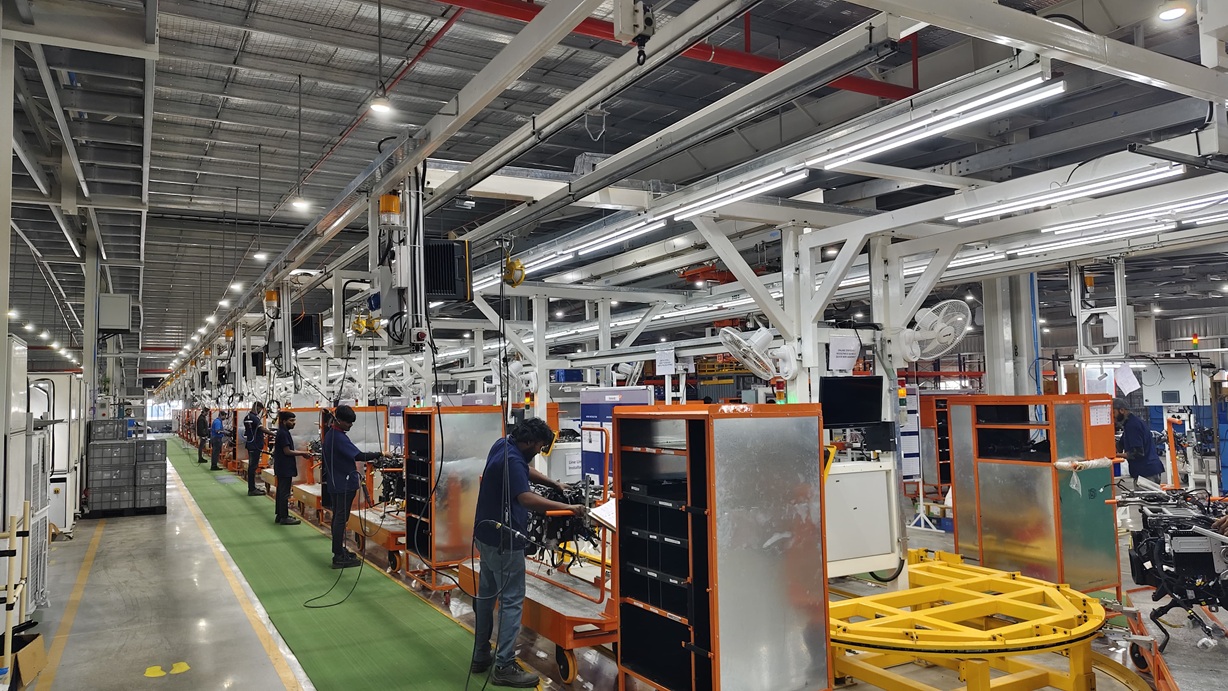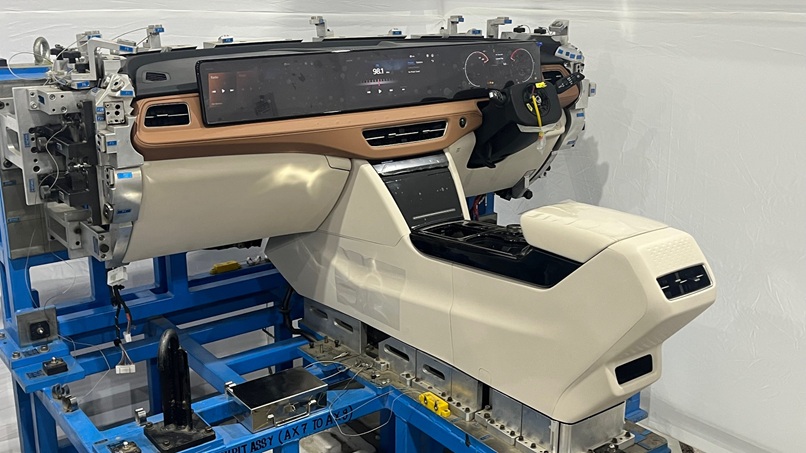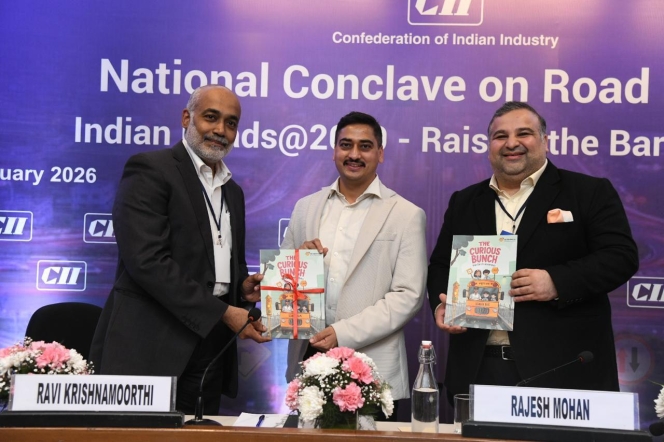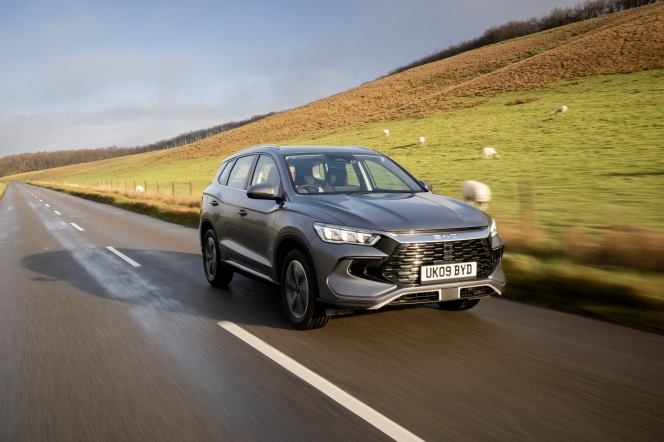- JSW MG Motor India
- Honda Motorcycle & Scooter India
- HMSI
- Ashok Leyland
- Federation of Automobile Dealers Association
- FADA
- PremonAsia
- Rahul Sharma
- C S Vigneshwar
Digital has now moved from ‘Nice to have’ to Necessity: Vinkesh Gulati
- By T Murrali
- December 19, 2020

Q: Congratulations on assuming the charge of the President of FADA. What are your immediate priorities?
Gulati: Thank you!
The past eight to nine months have been a challenging time for the entire humanity and every business sector. It has been a difficult phase for the dealer fraternity too. We have worked in very adverse conditions with zero business and zero earnings, along with a high operational cost. Post reopening of dealerships, proper decontamination and sanitisation of the entire premises, vehicles, employees, etc., have added cost to dealers who were already seeing slow sales for over 18 months in the pre-COVID era.
We are a resilient lot, and COVID has taught us to make tough decisions to ensure that our business and community survive, while offering the best of our services to customers. During my tenure, I will rigorously take up all our dealer issues at every possible platform and offer the association the finest representation, better visibility and hearing, offering a competitive business and operational environment to our fraternity.
The automobile industry has been an important driving force in India’s economic growth. Reviving the automobile industry is vital to regain lost momentum in the economy. The Government and the sector need to work together to strengthen the industry, wherein the dealer fraternity is an important element in the system.
One of the key issues which we will be working upon is improving dealer margins. Over the years, profitability has dwindled due to high costs and low operating margins.
Auto dealerships in India are operating at an average net profit level of 0.5 percent to one percent of the total turnover, which is much lower than the global standard, as internationally, dealer margins range from seven percent to 12 percent on selling price of the vehicle.
We have already written to SIAM about this, and we will further strongly urge all our OEMs to make the dealer business more sustainable and shockproof.
While we were trying to bring auto dealers under the ambit of MSME, we will up the ante further and make sure that dealers are treated at par with other businesses who are reaping the benefits of being an MSME.
Further, as a category, 2-wheelers comprise 75 percent of the sales in India, and I am working to make an exclusive 2-wheeler vertical at FADA.
This will specifically work on the nuances of 2-wheeler dealership such as sub-dealers, brokers etc. The dynamics of 2-wheeler dealers are very different from 4-wheeler dealers and hence need special attention. As they say, fortune is at the bottom of the pyramid!
FADA will continue to take up issues concerning regulatory and legislative burdens, representing the dealer fraternity across every possible platform. We will continue to reach out to our principals and build strong relationships moving ahead.
Q: FADA has been working on increasing dealer margins for ages but ends up in a stalemate. Where is the issue? How are you going to tackle this?
Gulati: Yes, this is one issue which we have been working for many years, but efforts were not made concretely until sometimes back. It’s during the 2nd Auto Retail Conclave, when we brought up the issue to our executive committee, had a panel discussion exclusively on dealer margins. There onwards, we started building momentum with continues efforts in this direction, and a few months back we also did a study on dealer margin offered by individual OEM to their respective dealers across the product lineup. This was an eye-opener for the entire fraternity as nothing of this sort was brought out in the past; this showcased that Indian dealer’s community were working on a minimal margin which was way below the global standards.
I am happy to mention that post this study, few OEMs have reviewed their dealer margin, few are in discussion with their management and respective dealer council. However, the increased margins are still not at a level which we have been asking for, but a movement has started, which is quite encouraging for the entire community.
Dealership business has a significant daily expense which is addressed by the dealer from his marginal profit. A better profit margin will help the dealer to re-invest a subsequent amount of his earning for the development and expansion of his business, which in return will add up a new business to OEMs.
We will continue to do this kind of studies in times to come and also keep negotiating with our principals as they also understand that their first customers are not in good shape and they require higher margins to sustain their business.

Q: What according to you are the skill gaps persist in the automotive industry still and how FADA is addressing this?
Gulati: Skill gap is a subject which is never-ending as technology keep changing, and we need to make a continuous effort to upgrade our manpower. In recent time, the automobile industry has gone a long way in terms of technology upgrade.
To address this change, all the three auto Associations (Automotive Component Manufacturers Association of India (ACMA), Federation of Indian Automobile Dealer Associations (FADA) and Society of Indian Automobile Manufacturers (SIAM)) have come together in tune with National Skill Development Council and created ASDC (Automotive Skill Development Council) which looks to reduce the gap in between yesterday’s skills and today’s requirement. FADA has been making a continues effort to keep our dealership manpower at par with the newer technologies.
At FADA, we are starting up with a FADA Academy which will hold courses for Dealer Principals and their Chief Experience Officers to train them in running an efficient dealership business from all aspects.
Q: With more than 50 percent of the work in purchasing any vehicle done online, where do you see the role of dealers in the future? Do you see the new trend fuelling unemployment further?
Gulati: Getting prospective customers through the online route is a growing trend. Dealers and manufacturers have been active on online platforms for quite a long time now. The pandemic is the reason for this change in consumer behaviour. Earlier, customers had to visit dealerships several times before the final buy. e.g. all loan formalities, document verification, vehicle test drive etc. These are now offered online or at the doorstep. But for the final sale, customers have to visit the dealerships to test the vehicle and take delivery.
Today every customer is well informed. The vehicle-buying experience involves several steps, right from an online search, specific automobile website visits, going through views, reviews, product comparison, collecting information from peers, social media and users and evaluating a brand, product and its services.
Only after doing all these research consumers make their decision. It is not just a transaction for the customer, but more about in getting into a relationship of trust. That is where the dealerships come into play. Every customer wants to experience the vehicle physically before closing the deal. More importantly, they want to meet up face-to-face with the dealer and satisfy themselves before committing to this high-ticket purchase.
I don’t think there is any change in the playbook, but digital has now moved from “Nice to have” to Necessity. In this COVID era, with total lockdown, digital marketing has played a significant role in boosting sales and smooth execution. Every dealership has initiated digital training of its manpower, equipping them to conduct sales coordination through a digital platform. This initiative has further enhanced its sales and service reach. Dealerships must be the most frugal and flexible link across the automobile network.
Dealers and dealerships have always been the face of the brand and will continue to be so. I don’t see any immediate challenge or threat to the dealership business. However, with companies being more aggressive and active on online platforms, this will add on to dealership engagement with the brand and the customers, helping them further to enhance their sales and service reach and experience.
 Q: What are the challenges you face with emerging technology trends like vehicle electrification?
Q: What are the challenges you face with emerging technology trends like vehicle electrification?
Gulati: I don’t see vehicle electrification as a challenge for the dealer fraternity. The dealer community has been one of the most adaptable segments of the automobile ecosystem. We have always strived to keep ourselves at par with the manufacturers, and it’s business requirement, product and services utility. The dealer business is one business which significantly depends on its skilled workforce across the offerings such as sales, aftersales, engineering, etc. With every new product or technology, the dealer in association with its OEM partner makes certain that it initiates rigorous training for its employees so that it can offer the best service to its customers on behalf of the brand.
As far as vehicle electrification is concerned, India is still at a very initial level as electric PVs still have less than 0.25 percent market share. The EV segment requires immense Government support in terms of infrastructure, subsidy, allowance, recognition, etc., to get the segment to grow. I don’t want to comment on the technicalities of the segment and its products and services. Instead, on behalf of the entire dealer fraternity, I would like to assure that as a community we are committed to offering all necessary support and service to the Government for its vision about the EV industry.
Q: Episodes like FIAT & Peugeot (decades ago) and GM & MAN Trucks (in the recent past) etc., exiting the Indian market continues, leading the dealerships to lurch. What kind of safeguard mechanisms can we have to support the dealer community?
Gulati: Setting up a global brand dealership in India is a massive cost which varies from brands to segment, size of the dealership, region, location, etc. On an average setting up a premium 2-wheeler brand dealership cost somewhere around INR8-10 crore whereas setting up a premium 4-wheeler brand requires close to INR 20 - 30 crore. It is not just the setting up of a dealership which is a cost, the operation of a dealership is also a huge which involves day to day operational cost, vehicle stocking, employee salary etc. The dealer bears all this. As you know, the dealership business operates on a very minimal profit margin; any such activity by any brand ends up leading to capital loss along with loss of jobs in the sector. And now the pandemic poses another challenge for the dealer fraternity.
For example, the recent announcement by Harley-Davidson to discontinue its manufacturing and sales operations in India has left its Indian dealers stranded. This will result in the closure of 35 Harley-Davidson dealerships, with an approximate capital loss of INR 110-130 crores, besides also leading to a job loss of around 1,800-2,000 people at dealerships.
This is the fourth instance of automobile companies exiting India in the last three years (since 2017). Earlier, General Motors, MAN Truck and UM Lohia had quit their Indian operations, leaving their dealers in a similar fix. Due to FADA’s strong intervention and the Indian Government’s full-fledged support, General Motors and MAN Trucks had partially compensated their channel partners, but the UML matter remains unresolved till date.
Had there been a Franchise Protection Act in India, brands like these would not have abruptly closed their operations, leaving their channel partners and customers in the lurch.
We are already working on a draft with our legal team and have initiated communication with other retail associations to bring the Franchise law in India, which will support the dealer fraternity in the dire situation of an exit or termination.
We would also request the Government to initiate the law on priority as this law will help level the playing field for large international and domestic automakers and dealers and also help in regulating over-dealerisation.
Q: What kind of support/guidance FADA has given to its members to tide over the current situation triggered by the pandemic?
Gulati: These are unprecedented times. Everybody is making the best efforts to emerge from it in their own way. The auto dealership is one such business which was deeply impacted by COVID-19. The auto dealership is a very marginal profit business, and we do not have large funds like car and component manufacturers have, which makes it more difficult for us to emerge from this difficult time. The industry was already struggling with a 15 to 16-month slowdown, and the lockdown has pushed the entire industry further back.
FADA has provided all possible and necessary help to its dealer members. At the time of the lockdown, FADA wrote a letter to Prime Minister Narendra Modi to apprise him about the dealers’ issues and suggesting dealership survival and demand revival initiatives. Apart from this, FADA wrote a letter to SIAM making them aware of the situation of the dealers, requesting them to review the dealer margin and extend their support so that dealer can survive these difficult times. FADA quite actively worked to protect dealers from the loss on remaining stocks of BS-IV vehicles from the ban on the sale. The association petitioned the Supreme Court to extend the dateline for sale of these vehicles. At the same time, while securing the future of dealers, FADA demanded that car makers increase the dealer margin to five percent PBT and reduce the infrastructure cost by 25 percent.
FADA conducted online training for its dealer brothers, training them to prepare for maximum work with limited resources. (MT)
- IAC India
- Lumax Group
- IAC Group
- Mahindra
- VECV
- Maruti Suzuki India
- Skoda
- Volkswagen
- Stellantis
- Sunil Koparkar
IAC India Bets On Engineering Depth & Diversification, Targets 20% CAGR Growth Till FY2030
- By Nilesh Wadhwa
- February 28, 2026

Sunil Koparkar, Managing Director, IAC India, outlines the company’s strategy to reduce customer concentration, expand exports and leverage group synergies following its integration with the Lumax Group.
As India’s automotive interior market evolves towards premiumisation, localisation and faster product cycles, IAC India, part of the Lumax Group, is repositioning itself beyond a single-customer dependency model – without diluting its core partnerships.
IAC India continues to derive a significant share of its revenue from Mahindra’s passenger vehicle business. While the concentration remains high, Koparkar is clear that diversification will be driven through growth rather than dilution.
“Mahindra will always be our primary customer. We have a very strong strategic partnership. But we are also working on expanding with other OEMs and in the commercial vehicle space. Our goal remains a 20 percent CAGR,” he says.
For FY2025, IAC India USD 140 million in revenue, and is targeting a 20 percent growth in FY2026. The company counts Mahindra as its primary customer with almost 78 percent of its business coming from them, while Maruti Suzuki India (12%), Volvo Eicher Commercial Vehicles (5%), Skoda-Volkswagen (3%) and Stellantis (1%) contribute towards the remaining business.
 What’s more, responding to the company’s expansion plans, Koparkar revealed, that IAC Group, in addition to introducing new products, is also in talks with new-age players who have just entered Indian market (and also planning too) for supplying products.
What’s more, responding to the company’s expansion plans, Koparkar revealed, that IAC Group, in addition to introducing new products, is also in talks with new-age players who have just entered Indian market (and also planning too) for supplying products.
Currently, passenger vehicles account for roughly 90 percent of the business, with commercial vehicles forming the balance. Value-wise, Koparkar expects CV contribution to rise, even if percentage splits remain broadly similar due to the rapid growth of PV volumes.
Responding to a query on the potential growth from the CV segment, Koparkar said, “There is clear potential in CV interiors. As the CV market moves towards more comfortable cabins — with features like airbags, HVAC and infotainment — the opportunity for interior suppliers increases. Through Volvo Eicher, we have already helped drive that trend in India.”
When asked about the company’s expansion plans, Koparkar also stated that IAC Group is open to expanding to new regions as it aims to operate closer to its customers. One of the potential new projects for the company could very well be Chennai, as the company is in early talks with a new CV customer as well as VinFast.
Engineering as a Standalone Growth Lever
A key pillar of IAC India’s strategy is its expanding engineering capability. The company has been scaling up its R&D and product development team and increasingly positioning engineering services as a distinct revenue stream.
The company at present, employs over 300 engineers in India, which it aims to scale it upto 400-plus by next year and 500-plus in the coming few years.

Historically, the Indian Engineering Centre supported the global IAC Group. “We were primarily the IAC Group engineering development centre. We will continue to provide those services. But now, besides global support, we are also offering engineering services to local OEMs,” Koparkar explains.
These services span studio collaboration, basic product design, CAE analysis and prototype development. In some cases, this can potentially evolve into full-scale supply programmes.
Importantly, innovation is now being formalised locally. “This year alone, we are in the process of filing about 30 patents,” he says. Earlier, intellectual property was subsumed under the global entity; now, filings are being initiated in India.
R&D investment remains aligned with group benchmarks at around 1.5–2 percent of revenue.
Exports: Measured Ambition
In terms of export potential, it currently contributes less than 5 percent towards the revenue, primarily through smaller kinematic parts. Direct exposure to the US market is negligible.
“Tariff-related uncertainty does not affect us because we do not export to the US,” Koparkar says. “Logistically, it does not make sense to ship our large interior parts there.”
Europe remains the primary export target. “The opportunity lies in leveraging our design capabilities and local development strengths. If logistics can be managed efficiently, there is room to grow.”
He also sees the Lumax Group’s aftermarket division as a future vehicle for export expansion.
Localisation and Supply Chain Resilience
On the localisation front, IAC India has made significant progress. “Last year was the first time we were able to localise over 99 percent of our tooling and development in India,” Koparkar states. Machinery on shop floors is largely localised, with only certain raw materials still imported.
The semiconductor crisis, he adds, had minimal direct impact. “We do not source electronics for our products — that is handled by the customer. However, from a development perspective, we are evaluating secondary substitutes for imported components, so we are prepared in case of disruptions.”
Premiumisation, Sustainability and AI
Premiumisation is currently the dominant interior trend. “Customers are moving away from basic plastics to more premium-feel interiors. Electronification is a big driver,” Koparkar says.
Sustainability, however, remains nascent in India. “There is no specific push for sustainable materials yet. What OEMs are looking for is lightweighting to meet upcoming CAFE norms. If a sustainable material delivers significant weight reduction, then it becomes serious.”

He points to jute, coir and bamboo fibres as potential alternatives but stresses that ecosystem-level collaboration is essential. “Unless a circular economy develops around us, sustainable materials will struggle to scale.”
On automation, operations across IAC’s six plants are roughly a 50:50 mix of automated and manual processes, depending on volume justification. Cobots and semi-automation are used where full automation does not offer viable returns.
AI, meanwhile, is expected to influence design more than manufacturing. “We see AI helping us accumulate design learnings and reduce design cycle times. Its impact will be more visible in engineering services than on the shop floor.”
Faster Development Cycles
Product life cycles are shrinking rapidly. “It used to take five years to develop a car,” Koparkar reflects. “With the XUV700, we worked with the customer to shrink that to 42 months. EVs are being developed even faster.”
As development timelines compress and interiors become more technology-intensive, IAC India is betting on engineering depth, localisation strength and group synergies to sustain its 20 percent growth ambition – while steadily broadening its customer and geographic footprint
- Rosmerta Technologies
- The Curious Bunch
- CII National Conclave on Road Safety
- Dr Rajesh Mohan
- Ravi Krishnamoorthi
- road safety
Rosmerta Launches Road Safety Comic Book For Schools
- By MT Bureau
- February 27, 2026

Rosmerta Technologies has launched a comic book titled ‘The Curious Bunch’ at the 3rd Edition of the CII National Conclave on Road Safety. The publication is designed to introduce road safety awareness to children.
The initiative aligns with the Government of India’s ‘4E’ strategy for road safety, which focuses on Engineering, Education, Enforcement and Emergency Care. The comic book aims to address the 168,000 road fatalities reported in India in 2022 by fostering safe habits at a school level.
The comic book uses illustrations to present road scenarios, including pedestrian conduct, school bus safety, traffic signals & the use of helmets, seatbelts and child restraint systems. By educating children, the company intends to influence the behaviour of parents and the wider community.
Rosmerta, a provider of mobility solutions, currently operates technology systems for automated driving tests and AI-based monitoring. The launch of ‘The Curious Bunch’ marks an expansion of its activities into the education pillar of the national safety framework.
Dr Rajesh Mohan, DCP, Gurugram Traffic, said, “When we educate children and instil strong moral and ethical values, the impact travels far beyond the classroom. Children naturally share what they learn. They question, they explain, and they influence conversations at home. In many ways, they become powerful advocates, encouraging their parents to be more aware, more responsible, and more engaged. Over time, this awareness translates into action, because parents are also drivers, commuters, and decision-makers on the road.”
Ravi Krishnamoorthi, Group President, Rosmerta Technologies, said, “Every road accident statistic hides a parent’s anxiety. In 2022 alone, India reported over 168,000 road accident fatalities, according to government data. Road safety is not merely about compliance; it is about compassion and collective responsibility. When a child understands why a red light matters or why a helmet can save a life, they don’t just learn a rule - they become ambassadors of safety within their families and communities. Through ‘The Curious Bunch’, we aim to nurture this awareness early, because the habits we shape in children today will define the safety culture of our nation tomorrow.”
- Maruti Suzuki India
- Transport Department of Tamil Nadu
- Automated Driving Test Tracks
- ADTT
- M K Stalin
- RTO
- CMVR
- Rahul Bharti
Maruti Suzuki Commissions Seven Automated Driving Test Tracks In Tamil Nadu
- By MT Bureau
- February 27, 2026
Maruti Suzuki India, in partnership with the Transport Department of Tamil Nadu, has announced the commissioning of seven Automated Driving Test Tracks (ADTTs) in the state. The facilities were inaugurated by the Chief Minister of Tamil Nadu, M K Stalin.
The tracks are located at Regional Transport Offices (RTOs) in Coimbatore (Central), Tiruvannamalai, Krishnagiri, Madurai (North), Sivagangai, Dindigul, and Tiruchirappalli (West). These sites form part of a Memorandum of Agreement to automate ten tracks across the state, with the remaining three at Tirunelveli, Tuticorin and Marthandam scheduled for operation shortly.
The ADTTs are designed to evaluate applicants for two-wheeler and Light Motor Vehicle (LMV) licences. The system removes human intervention from the evaluation process to ensure objective testing according to the Central Motor Vehicle Rules (CMVR).
Key technical components include:
- Video Analytics: High-definition cameras to monitor vehicle movement and path adherence.
- Sensors: Radio Frequency Identification (RFID) and Harnessing AutoMobiles for Safety (HAMS) technology.
- Identification: Face-recognition systems to verify candidate identity.
- Results: Integrated IT systems that generate test results automatically based on real-time data.
The carmaker has commissioned 56 ADTTs across eight states, including Uttar Pradesh, Delhi, and Bihar. Following the completion of agreements with Rajasthan and Andhra Pradesh, the company’s footprint is expected to reach 81 tracks nationwide.
Rahul Bharti, Senior Executive Officer, Corporate Affairs, Maruti Suzuki India, said, “As part of Maruti Suzuki’s road safety initiatives implemented across multiple states, we are partnering with the Government of Tamil Nadu to strengthen the driver licensing evaluation process through the deployment of 10 Automated Driving Test Tracks (ADTTs). Equipped with high-definition cameras and advanced analytics, these ADTTs enable a comprehensive, efficient, and transparent assessment process. It eliminates any human bias and ensures that only skilled drivers are awarded a license.”
“According to data shared by the Ministry of Road Transport & Highways, India witnessed 1.77 lakh road accident deaths in 2024. Promoting disciplined driving practices and ensuring rigorous driver evaluation are vital to prevent road accidents and augment road safety across the country,” he said.
BYD To sponsor BVRLA Annual Dinner 2026
- By MT Bureau
- February 26, 2026

BYD, the world’s leading manufacturer of New Energy Vehicles, will once again serve as the headline sponsor for the British Vehicle Rental and Leasing Association (BVRLA) Annual Dinner in 2026. This marks the third consecutive year the company has supported the prestigious event, which is set to take place on 4 March 2026 at the JW Marriott Grosvenor House Hotel on Park Lane, London. The dinner is widely recognised as the premier gathering for professionals across the rental, fleet management and leasing sectors.
Through its ongoing sponsorship since 2024, BYD reaffirms its commitment to this vital segment of the UK automotive market. The company’s expanding presence was underscored in 2025 by the introduction of several new models, including the SEALION 7, DOLPHIN SURF, SEAL 6 Saloon and Touring and the ATTO 2. These launches contributed to significant sales figures, with 21,824 units delivered to fleet customers and 5,964 to the rental sector. The momentum has continued into 2026 with the debut of the SEALION 5 DM-i, while the ATTO 2 DM-i and ATTO 3 EVO are expected to arrive shortly. Supporting this growth is a dedicated UK fleet team of 11 specialists, offering tailored product and service expertise.
The BVRLA represents around 1,000 member organisations, ranging from SMEs to large public companies, all operating within or alongside the UK’s vehicle rental and leasing industries. By engaging with government and upholding professional standards, the association enables its members to provide safe, sustainable and accessible transport solutions. This year’s Annual Dinner will feature the presentation of the Industry Hero Awards and live entertainment from award-winning comedian Tom Ward, celebrating excellence across the sector.






Comments (0)
ADD COMMENT